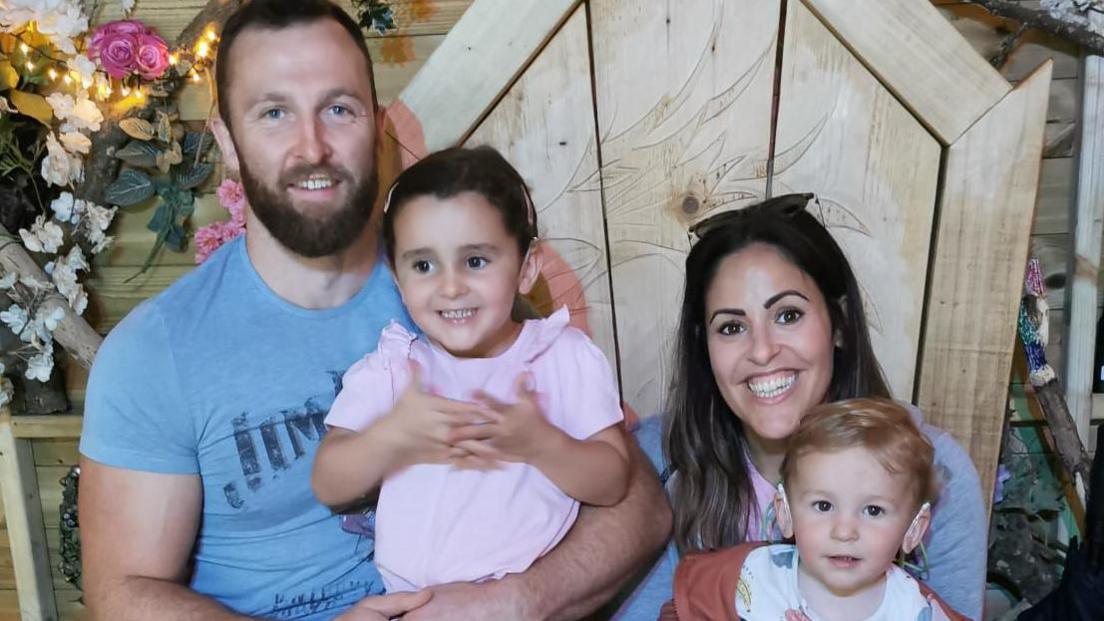Parent fears over drop in teachers of deaf children

'It is really worrying,' says Ros Hannam, pictured with husband Josh and children Lola and Rudi
- Published
The mum of two deaf children fears her family and others will have to βfend for themselvesβ if the numbers of teachers of the deaf continues to fall.
There are more than 2,000 deaf children in Wales and one in five teachers of the deaf have left the profession since 2011.
Ros Hannam, who has started a petition calling on the Welsh government to commit to restoring teacher numbers, said it was "really worrying".
The Welsh government said it was committed to developing the skills of the education workforce, including teachers of deaf children.
- Published23 October 2023
- Published20 June 2022
- Published30 July 2023
Lola and Rudi were both fitted with cochlear implants at about a year old
Ros lives in Caldicot, Monmouthshire, with husband Josh, and children Lola, five and Rudi, three, who were both born deaf.Β
They were fitted with cochlear implants - a surgically placed device - when they were about one.
With a week of their diagnosis they were visited by a teacher of the deaf.Β
"More than anything, just having someone who was an expert, that we could ask the questions of, as and when they arise, of whom we could all ask those questions of was really, really important," said Ros.
But the number of these teachers - who work with deaf children and their families to support their development - is falling.
A National Deaf Childrenβs Society report found there were 2,260 deaf children in Wales in 2023, and that 81% of those of school age are in mainstream education.
Research showed the number of fully qualified teachers of the deaf had dropped by 17% since the society's surveys began in 2011.
It also found 36% of peripatetic teachers of the deaf - who work within a range of settings - are aged 50 or over, and are therefore likely to retire in the next 10 to 15 years.
Ros said that "these children are going to have to largely fend for themselves in mainstream education, and are going to be at a significant disadvantage".
Rhiannon Ellis-Davies from Barry, Vale of Glamorgan, and her daughter Lucy have also been helped by teachers of the deaf.
Lucy, 22, was diagnosed as being profoundly deaf at nine months.
"She had one-to-one support from a dedicated teacher of the deaf, until she went to high school," said Rhiannon.Β
Lucy said: βIt was really important to have that support from early on. They got to see those first steps, and then everything in between".Β
There is nowhere in Wales where you can train to become a teacher of the deaf, says Rhiannon Davies, with her daughter Lucy
Thanks to this dedicated support, Lucy was able to attend university.Β
Rhiannon wanted to train to become a teacher of the deaf, and use her experiences with Lucy to help others, but found it was not straightforward.
βI went back to college, and got my degree, so I could then train to be one, but there is nowhere in Wales where you can train to become a teacher of the deaf,β Rhiannon said.
'We would really struggle'
Both feel more support is needed for families in their situation.Β
βLucy is a success story of going through the system, with that support, and I think that we were so lucky that we had it,β Rhiannon said.
Lucy said: βIf I was doing my time again, and I went back 22 years, I think we would really struggle.
βItβs easy to fall through the cracks, Iβve seen it happen. You need that support.βΒ
Hazel Badjie of the National Deaf Childrenβs Society said teachers of the deaf were incredibly important for a child's development.
"Childhood deafness is not a learning disability," she said.
"Therefore, with the right support, and most crucially, at the earliest point of diagnosis, it's really important that the teacher of the deaf is involved in a child's education.
"Unless urgent action is taken, there's an education crisis looming for deaf children."
Groups representing teachers of deaf children said all UK governments had recognised the need for their mandatory training since the early 1900s, and support for all schools and services was vital.
The British Association of Teachers of Deaf Children and Young People urged the Welsh government to revisit a 2008 funding initiative that "proved a short-term success as an increased number of teachers undertook the mandatory training".
The Welsh government said while councils had responsibility for specialist additional learning needs services, it was committed to developing classroom skills, including teachers of deaf children.
βAs part of our additional learning needs transformation programme, we distributed nearly Β£300,000 over three years to local authorities in Wales to support the post-graduate training of local authority-based specialist and advisory teachers of learners with sensory impairment," said a spokesperson.
- Published17 December 2023
- Published5 May 2023